Kuroneko Blu-ray Movie
HomeKuroneko Blu-ray Movie 
藪の中の黒猫 / Yabu no naka no kuroneko / Masters of CinemaEureka Entertainment | 1968 | 99 min | Rated BBFC: 15 | Jun 24, 2013
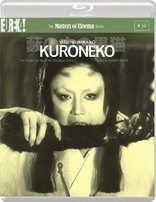
Movie rating
7.7 | / 10 |
Blu-ray rating
| Users | 4.0 | |
| Reviewer | 3.5 | |
| Overall | 3.7 |
Overview
Kuroneko (1968)
In medieval Japan, a military hero is sent to battle a strange apparition that has been killing samurai.
Starring: Kichiemon Nakamura, Nobuko Otowa, Kiwako Taichi, Kei Satô, Hideo KanzeDirector: Kaneto Shindô
| Foreign | Uncertain |
| Drama | Uncertain |
| Horror | Uncertain |
| Supernatural | Uncertain |
Specifications
Video
Video codec: MPEG-4 AVC
Video resolution: 1080p
Aspect ratio: 2.35:1
Original aspect ratio: 2.35:1
Audio
Japanese: LPCM Mono (48kHz, 24-bit)
Subtitles
English
Discs
50GB Blu-ray Disc
Single disc (1 BD)
Playback
Region B (locked)
Review
Rating summary
| Movie | 4.0 | |
| Video | 3.5 | |
| Audio | 4.5 | |
| Extras | 1.5 | |
| Overall | 3.5 |
Kuroneko Blu-ray Movie Review
Reviewed by Dr. Svet Atanasov June 20, 2013Winner of Best Actress and Best Cinematography Awards at the Mainichi Film Concours, Japanese director Kaneto Shindo's "Yabu no naka no kuroneko" a.k.a "Kuroneko" (1968) arrives on Blu-ray courtesy of British distributors Eureka Entertainment. The only supplemental feature on the disc is an original Japanese trailer for the film. The release also arrives with a 32-page illustrated booklet featuring: "Shindo’s Kuroneko" by Doug Cummings (2005), "Interview with Shindo" by Joan Mellen (1972), and rare archival imagery. In Japanese, with optional English subtitles for the main feature. Region-B "locked".
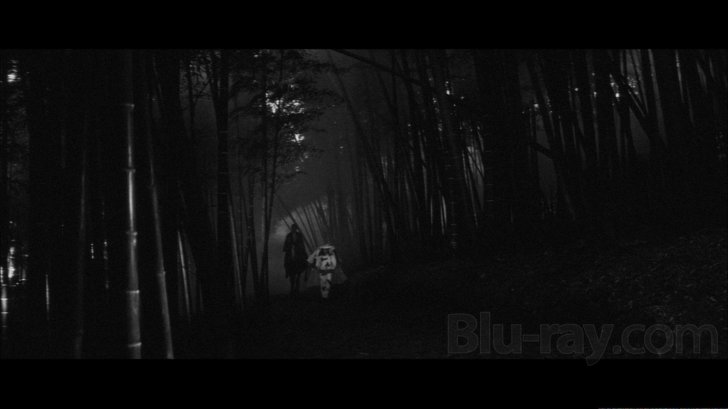
In the forest
Kaneto Shindo’s Kuroneko reminded me a lot about Yasuzo Masumura’s Red Angel. Thematically, the two films have practically nothing in common but both are very atmospheric and, as strange as it may sound, despite being quite violent they are also remarkably erotic.
In Red Angel a young nurse played by the stunningly beautiful Ayako Wakao is sent to a field hospital during the Sino-Japanese war. There she assists an older and impotent doctor who is addicted to morphine. As time goes by, the two become close and eventually fall in love while people around them are dying like flies. The film is graphic and at times seriously disturbing but also incredibly beautiful and seductive.
Kuroneko is set during the Sengoku Jidai (the Warring States) period and tells the story of two women, a mother (Nobuko Otowa, The Naked Island, Onibaba) and her daughter-in-law (Kiwako Taichi, Strange Affinity, Live Today, Die Tomorrow!), who are raped by a gang of samurai. The women and their farmhouse are burned down, but their souls return as evil ghosts and swear to kill every single samurai in the land. (Don’t worry, I did not spoil the film for you).
After the ghosts begin hunting the samurai, a young warrior named Gintoku (Kichiemon Nakamura, Double Suicide, Gateway to Glory) is summoned by his master (Kei Sato, Harakiri, The Sword of Doom) and ordered to confront them. Eager to impress and earn himself a good reputation, Gintoku immediately heads to the Rajomon Gate, where he encounters one of the ghosts. Much to his surprise, the ghost turns out to be a beautiful woman who looks very much like his former wife.
Kuroneko (which translated into English means black cat) is a film of two halves. The first is gritty and unsettling, uncompromising and ugly, firmly grounded in reality. The samurai and the two women they rape belong to a world where everything makes sense – the strong prevail and the weak suffer.
The second half is drastically different. Certain sequences are still gritty, unsettling and violent, but now they drip with surreal atmosphere that changes the entire complexion of the story. For instance, when Gintoku and the ghost meet one could immediately tell that they are attracted to each other, though one does not know whether it is sexual attraction or something else that they feel. Considering the various gruesome killings that one has witnessed prior to their encounter, the sudden erotic overtones move the film into an entirely different territory.
These strange erotic overtones are what reminded me about Red Angel. They counter the ugly and horrific in a familiar fashion and shift the focus of attention elsewhere. Kuroneko and Red Angel are both horror films but also remarkably sensual and darkly seductive films.
Shindo, who is probably best known for his terrific The Naked Island and Onibaba, is a skillful director who understands and knows exactly how to create and maintain a tense and moody atmosphere. Assisted by cinematographer Kiyomi Kuroda, who also lensed the two films mentioned above, he infuses Kuroneko with a distinctive neo-gothic flavor which gradually takes over the film after the two ghosts begin hunting the samurai. The sequences from the bamboo forest for example look and feel like bizarre dreams - they are dark and slow, disturbing but beautiful, unreal yet believable.
Note: In 1969, Kuroneko won Best Actress (Nobuko Otowa) and Best Cinematography (Kiyomi Kuroda) Awards at the Mainichi Film Concours.
Kuroneko Blu-ray Movie, Video Quality 
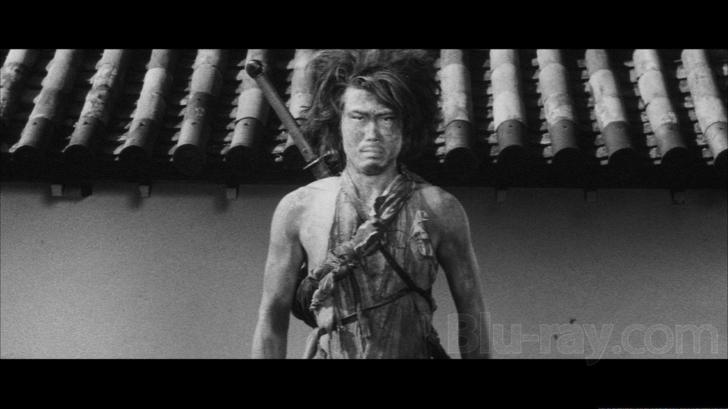
Presented in its original aspect ratio of 2.35:1, encoded with MPEG-4 AVC and granted a 1080p transfer, Kaneto Shindo's Kuroneko arrives on Blu-ray courtesy of British distributors Eureka Entertainment.
The high-definition transfer this release uses is not identical to the one Criterion used for their Blu-ray release of Kuroneko in the United States. First, it is notably darker. In fact, brightness and even contrast levels have been toned down so much that during select sequences there are entire objects that are either very difficult or simply impossible to see (compare screencapture #6 with screencapture #2 from our review of the Criterion release to see what type of information is missing). During the nighttime footage from the second half of the film it becomes even more difficult to follow the action because it almost feels as if there is a very thick black filter (see screencaoture #16). Second, the daylight footage looks far more pleasing, but clarity is again not overly convincing. (Compare screencaptures #2 with screencapture #3 from our review of the Criterion release). Random scratches, specks, and flicker are also present. The good news here is that there are no traces of excessive degraining and sharpening corrections. However, the various source limitations that have transitioned to the raw transfer certainly make the film look quite uneven. On the Criterion release additional adjustments have been made to rebalance and clean up the image and the final result is indeed a lot more convincing. All in all, I think that this release could be a good alternative for fans of Kuroneko residing in Region-B territories, but I like a lot more Criterion's clearly superior presentation of this classic Japanese film. (Note: This is a Region-B "locked" Blu-ray release. Therefore, you must have a native Region-B or Region-Free PS3 or SA in order to access its content).
Kuroneko Blu-ray Movie, Audio Quality 
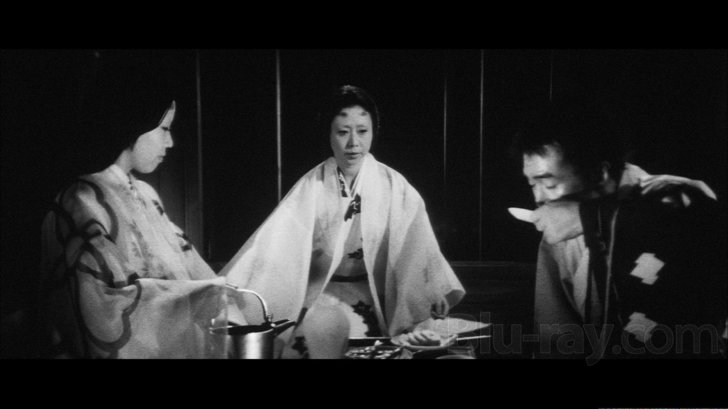
There is only one standard audio track on this Blu-ray release: Japanese LPCM 1.0. For the record, Eureka Entertainment have provided optional English subtitles for the main feature. When turned on, they appear inside the image frame.
The lossless track serves the film very well. Dynamic intensity is rather limited, but Hikaru Hayashi's minimalistic score is still very effective. Random nature sounds and other noises are also clearly identified. The dialog is stable, clear, and free of problematic background hiss. The English translation is very good.
Kuroneko Blu-ray Movie, Special Features and Extras 
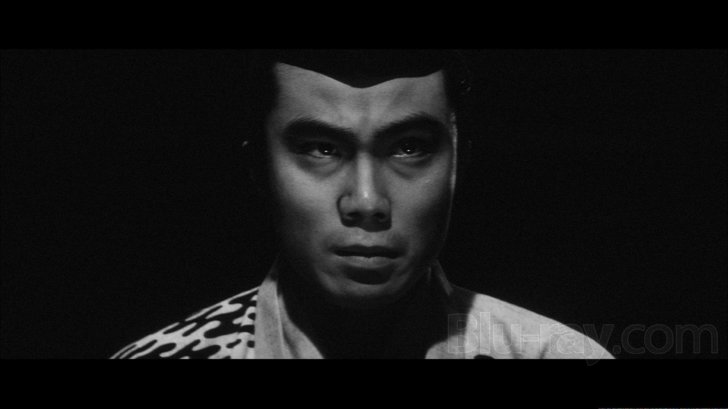
- Trailer - original Japanese trailer for Kuroneko. In Japanese, with optional English subtitles. (3 min, 1080p).
- Booklet - 32-page illustrated booklet featuring: "Shindo's Kuroneko" by Doug Cummings (2005), "Interview with Shindo" by Joan Mellen (1972), and rare archival imagery.
Kuroneko Blu-ray Movie, Overall Score and Recommendation 
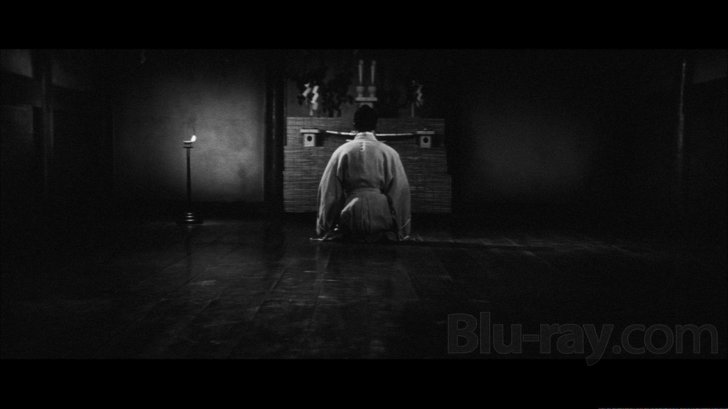
Eureka Entertainment's Blu-ray release of Kaneto Shindo's Onibaba could be a good alternative for fans of the film residing in Region-B territories who wish to upgrade their DVD release of the film. Those who have Region-Free players, however, should look at Criterion's Blu-ray release as it offers a more convincing presentation of the film, as well as a long interview with the late Japanese director conducted by assistant director Seijiro Koyama and a second interview with Japanese cinema critic Tadao Sato.
Other editions
Kuroneko: Other Editions
Similar titles
Similar titles you might also like

Onibaba
鬼婆 / The Demoness / Masters of Cinema
1964

Kwaidan
怪談 / Kaidan / Masters of Cinema
1965

Harakiri
切腹 / Seppuku / Masters of Cinema
1962

Sansho the Bailiff
山椒大夫 / Sanshô dayû
1954

Throne of Blood 4K
蜘蛛巣城 / Kumonosu-jô
1957

Sisters of the Gion
Gion no shimai
1936

An Actor's Revenge
雪之丞変化 / Yukinojô henge
1963

The Life of Oharu
西鶴一代女 / Saikaku ichidai onna
1952

Cemetery of Splendour
รักที่ขอนแก่น / Rak ti Khon Kaen
2015

Three Outlaw Samurai
三匹の侍 / Sanbiki no samurai
1964

Floating Weeds
浮草 / Ukigusa / Masters of Cinema
1959

House
ハウス / Hausu | Masters of Cinema
1977

Horse Money
Cavalo Dinheiro
2014

La Notte 4K
The Night | Masters of Cinema | Limited Edition
1961

Hara-Kiri: Death of a Samurai
一命 / Ichimei
2011

Dark Water
仄暗い水の底から / Honogurai mizu no soko kara
2002

Evil of Dracula
Chi o suu bara
1974

Profound Desires of the Gods
神々の深き欲望 / Kamigami no Fukaki Yokubo / Masters of Cinema
1968

Tokyo Story
Remastered | 東京物語 / Tôkyô monogatari
1953

The Painted Bird
Nabarvené ptáce / Montage Pictures
2019
